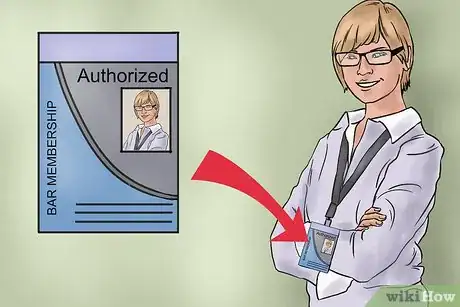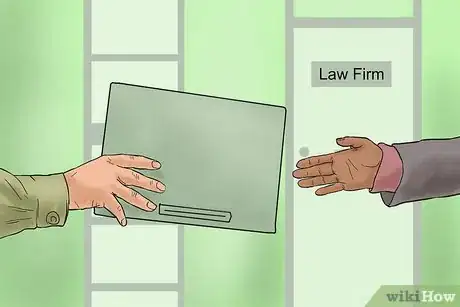This article was co-authored by wikiHow Staff. Our trained team of editors and researchers validate articles for accuracy and comprehensiveness. wikiHow's Content Management Team carefully monitors the work from our editorial staff to ensure that each article is backed by trusted research and meets our high quality standards.
There are 12 references cited in this article, which can be found at the bottom of the page.
This article has been viewed 28,169 times.
Learn more...
Many lawyers never see a courtroom. Instead, they help business clients make deals. Mergers and acquisitions attorneys work with businesses to secure financing and draft contracts for the purchase of other businesses.[1] These types of jobs—called “M&A” jobs—are fairly rare, and you’ll need to do very well in law school to have a shot at a big firm. Prepare early by scoring high on the Law School Admission Test (LSAT) and acing your first-year classes. To get a job at a large law firm, you’ll want to participate in On-Campus Interviewing.
Steps
Earning the Necessary Education
-
1Obtain a bachelor’s degree. In the U.S., you need a four-year degree to apply to law school. You can take any subject you want—English, history, engineering, business, etc.[2] You do not have to take a “pre-law” major, and most colleges don’t offer it.
- It’s important that you do as well as you can. Most law students have at least a 3.00 when they graduate. If you want to go to a top-ranked school, you’ll need to do even better—closer to a 3.7 or higher. Your undergraduate GPA is one of the most important factors in law school admissions.
- In countries outside the U.S., you may be able to earn a law degree as an undergraduate. However, if you want to practice as an M&A lawyer in the U.S., you’ll probably need to get a master’s of law (LLM) or complete the juris doctor (JD) at a law school in the U.S.
-
2Take the LSAT. Doing well on the LSAT is critical for getting into law school. The average score is around 150,[3] and you might not get admitted to any law school if you do worse than this. Accordingly, you should take the exam very seriously.
- The LSAT is offered four times a year, typically in September, December, February, and June. The exam is offered on Saturdays, but special Monday tests are available for those who observe a Saturday Sabbath.[4]
- The exam tests reading comprehension, logical reasoning, and analytical reasoning. There is also an unscored writing sample.[5]
- You should certainly study. You could pay for a prep course, which can cost hundreds of dollars.
- Alternately, you can buy old exams online and take practice exams.
Advertisement -
3Identify law schools where you are competitive. Law school admissions is really the function of two numbers: your LSAT score and your undergraduate GPA. Law schools will consider other factors—graduate degrees, work experience, life experience, etc. However, these other factors might only be used as tiebreakers to distinguish between two candidates. You can get a good idea of your chances at a particular school by using an online calculator.
- The Law School Admission Council (LSAC) has a calculator you can use here: https://officialguide.lsac.org/release/ugpalsat/ugpalsat.aspx.
- Enter your LSAT and GPA. You will see your likelihood of getting into accredited law schools.
- Remember to apply to “safeties” as well as to “reaches.” A reach is a dream school. Yale is a reach for someone with a 3.4 GPA and a 160 LSAT. By contrast, safeties are schools where you should definitely get in based on your numbers.
-
4Compare law schools. You’ll need to spend some time comparing law schools so that you pick the right school for you. There is no one factor you should consider more important than any other. However, you should typically weigh the following:
- National ranking. M&A lawyers tend to work for large or medium law firms, and these firms generally hire more people from higher-ranked law schools.[6] Accordingly, you should pay attention to a law school’s U.S. News & World Report ranking.
- Costs. Private law schools can charge $40,000 or more in tuition alone. You will need to pay for living expenses, fees, and books. Analyze the costs to attend a school and compare it to the likelihood that you’ll find a job.
- Job placement. Pay attention to the school’s general placement statistics for recent graduates. Even if you choose not to become an M&A attorney, you’ll still want a job after you graduate. Law schools vary greatly in their ability to place graduates in legal jobs.
- Curriculum. Most law schools offer the same courses. However, some have begun offering special tracks in mergers and acquisitions. You should check to see if the school has an M&A specialty.
-
5Apply to law school. The application process is quite lengthy. In the U.S., you’ll register with LSAC’s Credential Assembly Service (CAS). You send them your supporting materials and they forward them to the schools you request. By using CAS, you can avoid having to complete applications for each school.[7]
- You’ll need to send CAS copies of all academic transcripts—undergraduate and any post-graduate courses you’ve taken.
- People who write letters of recommendation will also send them to CAS. You will probably need at least two letters of recommendation from professors or work supervisors.
- However, you’ll have to write a personal statement for each individual law school and submit it directly to the school.
- Applications can cost about $100. If you can’t afford that, ask for a waiver.
-
6Do well in your first-year classes. Large law firms look primarily at your first-year grades, since all students take the same set of courses and firms can compare how well you did. You’ll need to do as well as possible to be competitive. First-year courses include:[8]
- Civil Procedure
- Contracts
- Torts
- Criminal Law
- Constitutional Law
- Property
- Legal Writing or Legal Methods
-
7Take appropriate electives. Your final two years of law school will generally be devoted to electives. Take as many M&A-related courses as you can find. For example, you could take the following electives:
- Business Associations
- Federal Income Tax
- Securities Regulation
- Accounting for Lawyers
- Mergers and Acquisitions
- Antitrust Law
Getting Your Law License
-
1Pass the MPRE. You’ll take this test in law school, typically in your third year. It contains 60 multiple-choice questions and covers professional responsibility. Almost every state requires that you pass the exam before you can be given a law license.[9]
- The exam is typically offered in March, August, and November.
- Sample test questions are available for free on the MPRE website. You may also purchase a practice test. The practice test comes with an answer key and explanations.[10]
-
2Identify where you want to work. In the U.S., each state licenses its own attorneys. Accordingly, if you want to practice in New York, you need the New York Bar to license you. You’ll need to register with the state where you want to practice.
- If you want to work in D.C., then you can get a license from any state.
-
3Complete a background survey. You must disclose detailed information about your history to the bar committee as part of a “character and fitness” test. A background survey will ask for information about prior employment, education, criminal or legal history, and financial information.
- There are some red flags the character and fitness committee will take note of: criminal records, substance abuse or mental illness (if untreated), and financial irresponsibility.[11]
- If there’s an issue, the committee will call you in for an interview. You should consult with an attorney who specializes in professional responsibility beforehand. They can help you strategize for the meeting.
- The worst thing you can do is fail to disclose something. If the committee catches you lying, then you definitely won’t get a license. Accordingly, you should be upfront, even about embarrassing information.
-
4Study for the bar exam. In most states, the bar exam is offered twice a year, usually in February and June/July. It will take two days. You’ll need to pass a multiple-choice exam on one day and then answer essay questions on the other day. This exam covers a wide range of material, so you will want to study.
- Some people pay thousands of dollars to take a bar exam prep course, which you can find online.
- If you can’t afford a study course, then you can usually get used BarBri outlines from Amazon or eBay. These will help you study for the exam.
-
5Pass the bar exam. The 200-question multiple choice exam (MBE) covers contracts, torts, real property, evidence, criminal law and procedure, constitutional law, and civil procedure.[12]
- Essays can cover the same topics as the MBE but also other ones. For example, it is common for states to ask essay questions about their rules of civil procedure. States might use essay questions prepared by the National Conference of Bar Examiners, or they may create their own.
- It generally takes a few months before you find out whether you have been admitted to the bar.
Finding an M&A Job
-
1Apply to become a summer associate with a firm. Large and medium-sized law firms typically hire summer associates to work during your 2L summer. You will apply before the start of your 2L year, and firms often come onto campus to interview.[13] You should consult with your school’s career center for more information about how to participate in this interview process.
- Research firms to see that they have M&A practices. Not all firms do. Go on the firm’s website and check.
- Ideally, the M&A practice should be large. Firms with smaller M&A practices may only hire one new associate a year.
-
2Get M&A assignments as a summer associate. Typically, you can take assignments from any practice area. However, the firm will want to assign you to a practice area when they extend an offer. You should take as many corporate or finance assignments as possible to show your interest in the area.
- At the end of your summer, the firm will decide which associates to offer full-time employment to. If all goes according to plan, you will know which firm you will be working for before you start your 3L year.
-
3Look for job openings throughout the year. Firms sometimes hire new lawyers throughout the year, though this is rare. Larger firms typically want experienced lawyers, who they will hire as laterals. They usually hire new graduates only through On-Campus Interviewing.
- Nevertheless, you can see if any openings become available during the school year or after you graduate. Medium-sized firms might realize that they need a new associate, so you can put together your application materials (resume, transcripts, writing sample).
- Your career center should have a job bank you can search. Meet with a career counselor to discuss your options.
-
4Lateral into an M&A position. You might start out as an attorney doing non-M&A work. If so, you should look for job openings in M&A. Larger law firms often hire experienced attorneys as laterals, so you should keep your eyes open.
- Look on law firm websites, which should have a section devoted to job openings.
- Also network with M&A lawyers, who might know of job openings at medium-sized firms. You can meet M&A lawyers at bar association events. Make sure you have business cards to hand out.
- Ideally, you should be working in a transactional legal field already, such as real estate. It might be hard to lateral as a litigation associate.
Community Q&A
-
QuestionCan I become a lawyer if I studied history and geography?
 Community AnswerYes, many lawyers studied liberal arts prior to attending law school.
Community AnswerYes, many lawyers studied liberal arts prior to attending law school.
References
- ↑ https://www.law.georgetown.edu/careers/career-planning/practice-areas/mergers-acquisitions.cfm
- ↑ http://www.lsac.org/jd/diversity-in-law-school/racial-ethnic-minority-applicants/minorities-in-legal-education-applying-to-ls
- ↑ http://lawschoolnumbers.com/lsat-prep/what-is-a-good-lsat-score
- ↑ http://www.lsac.org/jd/lsat/test-dates-deadlines
- ↑ http://www.lsac.org/jd/lsat/about-the-lsat
- ↑ https://www.law.georgetown.edu/careers/career-planning/practice-areas/mergers-acquisitions.cfm
- ↑ http://www.lsac.org/jd/applying-to-law-school/cas
- ↑ https://www.princetonreview.com/law-school-advice/first-year-curriculum
- ↑ http://www.ncbex.org/exams/mpre/
- ↑ http://www.ncbex.org/exams/mpre/preparing/
- ↑ http://www.americanbar.org/publications/syllabus_home/volume_44_2012-2013/winter_2012-2013/professionalism_whatdoesittaketosatisfychracterandfitnessrequire.html
- ↑ http://www.ncbex.org/exams/mbe/preparing/
- ↑ http://law.scu.edu/careers/how-to-find-a-job/oci-on-campus-interviews/











































































